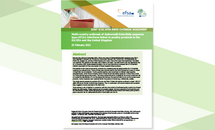Rapid Outbreak Assessment: Multi-country outbreak of multiple Salmonella enterica serotypes linked to imported sesame based products
Since January 2019, 121 cases of Salmonella enterica infections with six different serotypes linked to sesame-based products have been reported in five EU/EEA countries. The serotypes are S. Amsterdam, S. Havana, S. Kintambo, S. Mbandaka, S. Orion, and S. Senftenberg. Case interviews in four countries revealed consumption of sesame-based products (halva or tahini) prior to illness. Almost half of the cases are in children ≤10 years, who also represent over half of hospitalised cases. No deaths have been reported.
Since November 2019, 14 batches of sesame-based products originating from Syria, tested positive for one or multiple Salmonella outbreak strains (twelve from Brand A, two from Brand C).
Based on available epidemiological, microbiological, and traceability information, the probable vehicles of infection are sesame-based products imported from Syria, at least in countries involved in the traceability of the positive batches. These products are sealed and ready to be consumed, suggesting that the contamination occurred before the products reached the European Union/European Economic Area (EU/EEA) market.
The intermittent occurrence of human cases and the identification of positive food samples since 2019 indicate the availability of the contaminated sesame-based products on the EU/EEA market for over two years. This has posed a risk for human infections and severe clinical illness with several Salmonella serotypes, particularly among children.
Control measures implemented since August 2020 on the involved batches of sesame-based products have not prevented the occurrence of human cases to date. Moreover, the concerned products have a long shelf life and might still be stored in people’s homes.
Considering the limited information on product manufacturing and distribution, there remains a risk for new Salmonella infections in the EU/EEA linked to imported sesame-based products from Syria.






